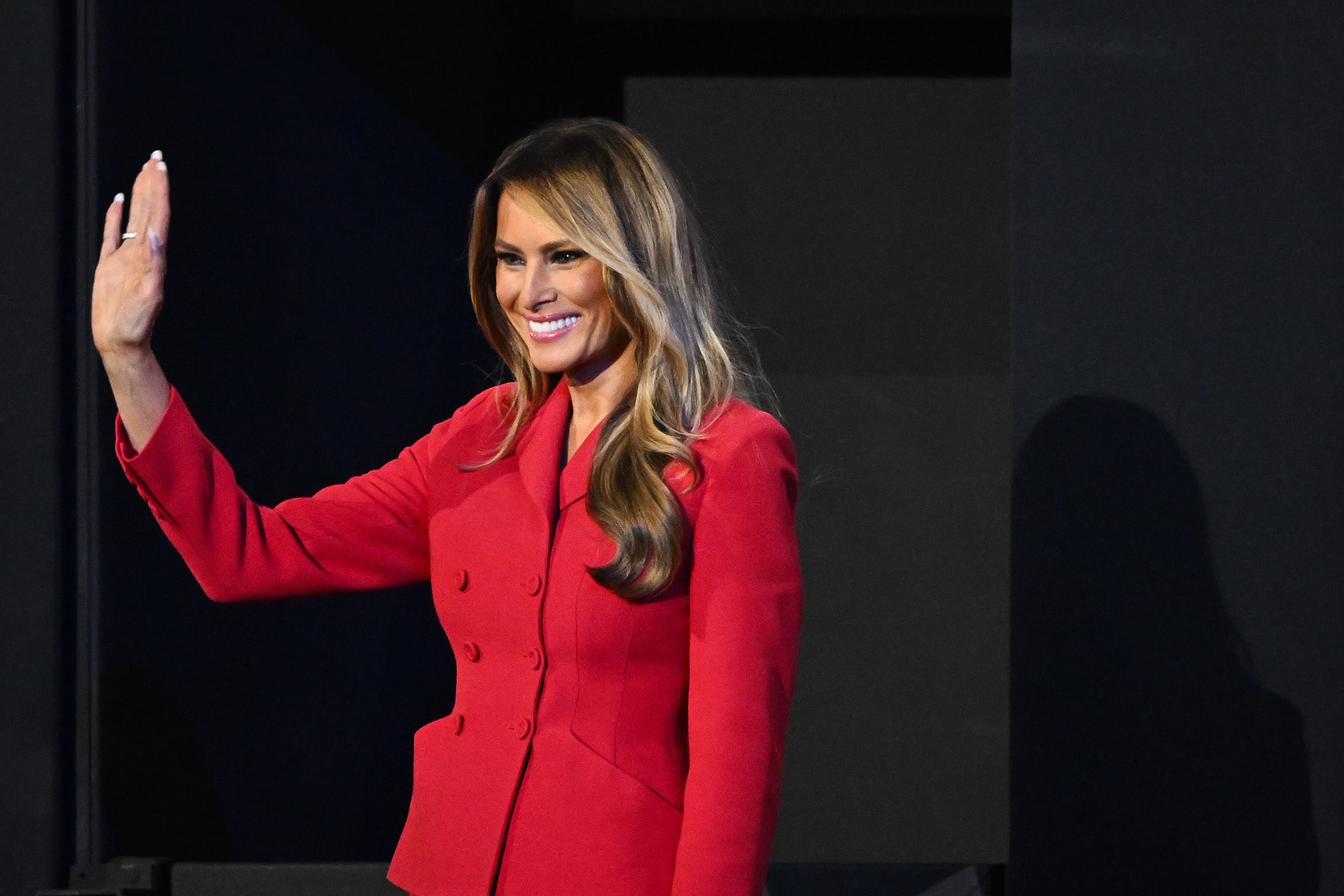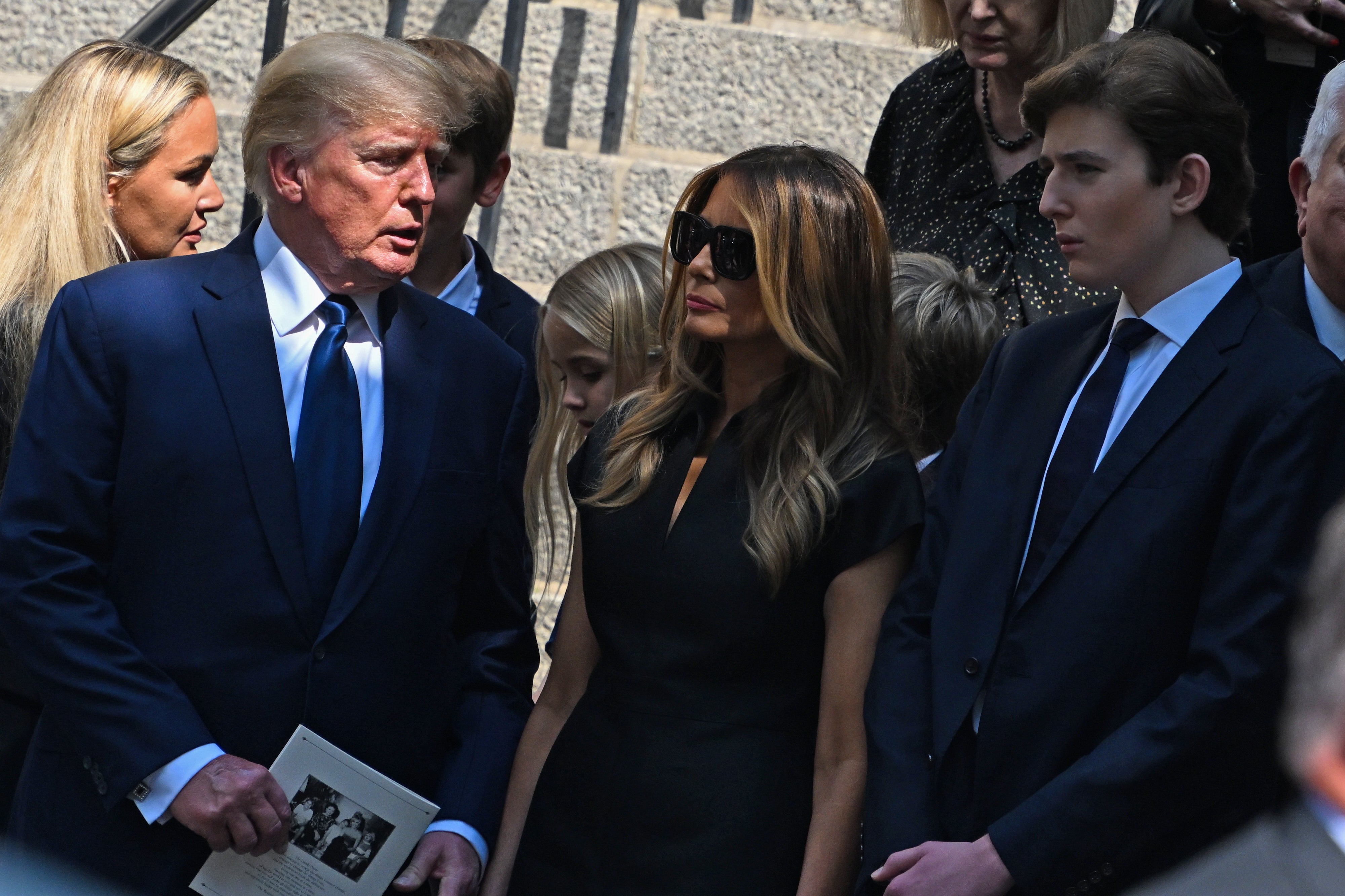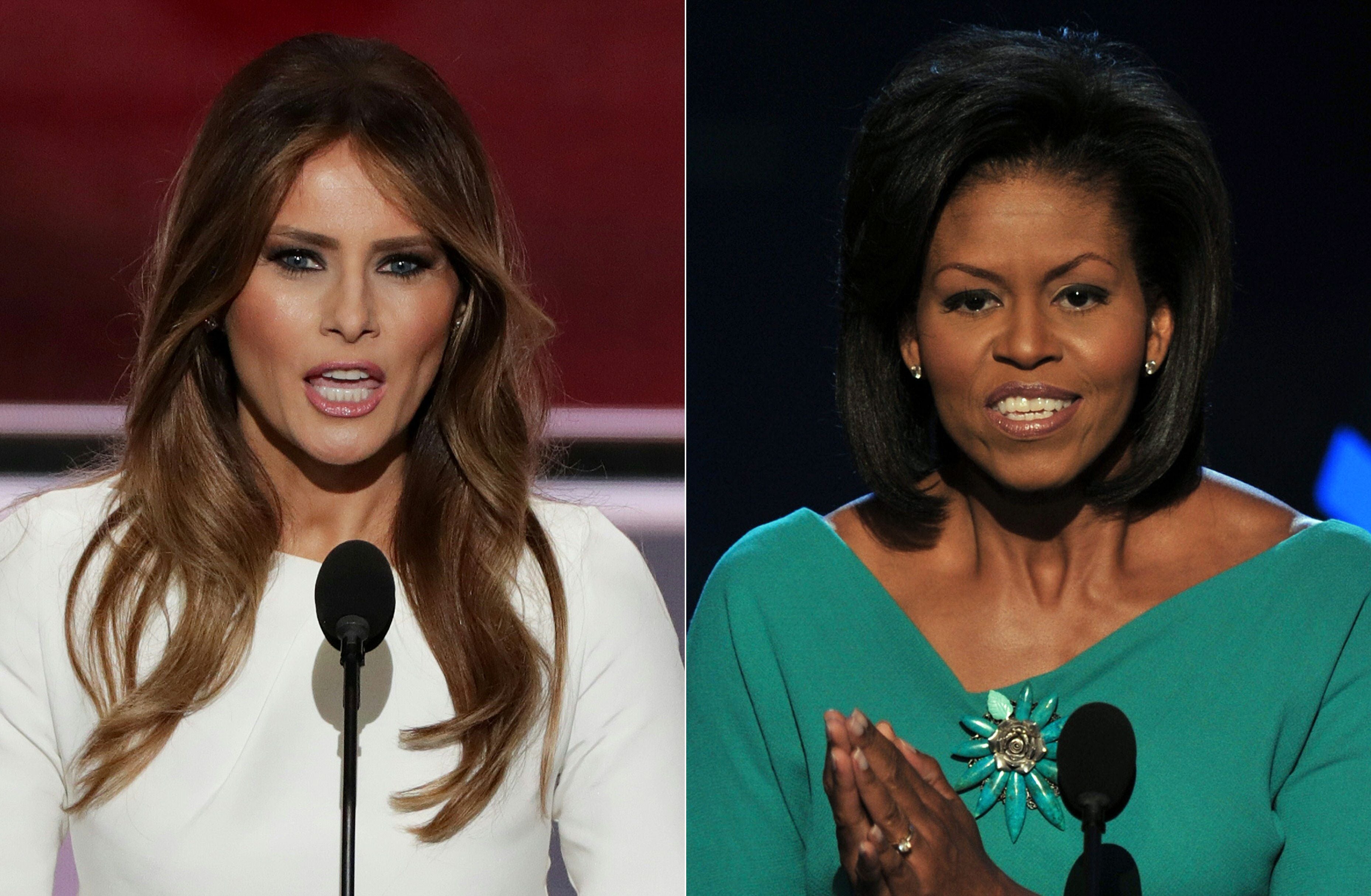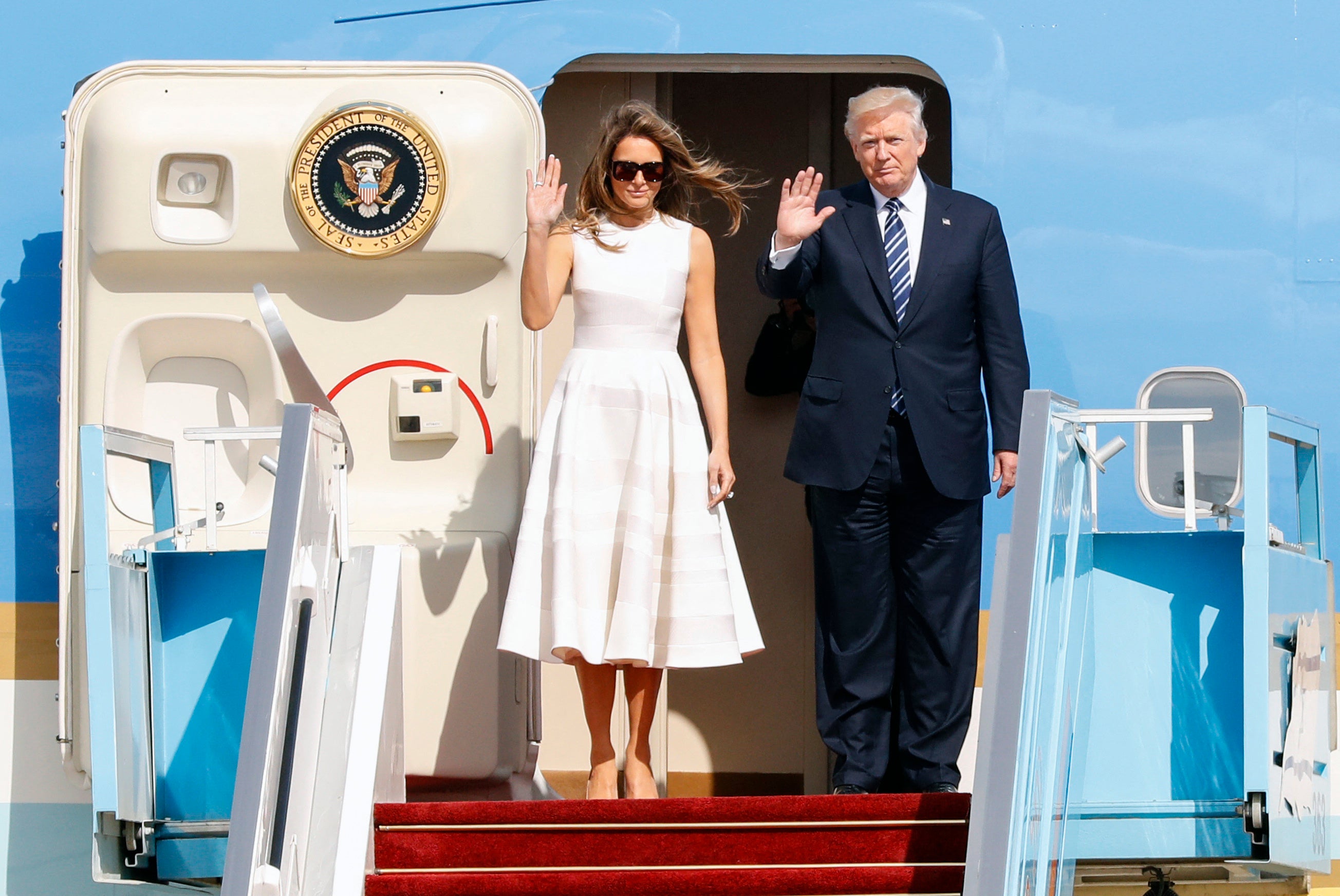Donald, abortion, Barron and more: All the best revelations from Melania Trump’s new book
Melania Trump’s new memoir reads like a stilted chronological recounting with a smattering of out-of-left-field statements about her politics and marriage that raise only more questions about just who she really is, writes Sheila Flynn

Your support helps us to tell the story
From reproductive rights to climate change to Big Tech, The Independent is on the ground when the story is developing. Whether it's investigating the financials of Elon Musk's pro-Trump PAC or producing our latest documentary, 'The A Word', which shines a light on the American women fighting for reproductive rights, we know how important it is to parse out the facts from the messaging.
At such a critical moment in US history, we need reporters on the ground. Your donation allows us to keep sending journalists to speak to both sides of the story.
The Independent is trusted by Americans across the entire political spectrum. And unlike many other quality news outlets, we choose not to lock Americans out of our reporting and analysis with paywalls. We believe quality journalism should be available to everyone, paid for by those who can afford it.
Your support makes all the difference.The teasers for the memoir were sleek, enigmatic and reflective of the image held world-over of Melania Trump herself – a woman oft photographed but always inscrutable at the side of America’s most controversial man.
She acknowledges as much in the author’s note preceding the eponymous Melania, dangling the promise of a glimpse into her mind and everyday reality, writing that she hopes “to show you the woman behind the public persona, to illuminate the values and experiences that have shaped me, and to offer insights into the complexities of life in the public eye.
“As a private person who has often been the subject of public scrutiny and misrepresentation, I feel a responsibility to set the record straight and to provide the actual account of my experiences,” she continues.
What follows, however, is a direct contradiction of the writer’s golden rule of “Show, don’t tell.” Melania reveals herself to be a fan of simple declarative sentences and trios of adjectives, but there are no illuminating anecdotes. The memoir does not mention a single friend by name; there are only two fleeting mentions of friends at all. Even when describing what she holds most dear – her late mother, for example, or her love for the troops and America – Melania simply quotes the full text of speeches she’s given in the past.
It’s weird, frankly. And it’s disappointing – because it’s clear there is more depth to the former First Lady. Her love of motherhood and children is evident. She seems to have a keen eye for design, education in architecture and commitment to historic preservation. But the memoir reads like a stilted chronological recounting of selected events with a smattering of out-of-left-field statements about her politics and marriage that raise only more – and more interesting – questions about just who Melania really is.
She grew up under communism but didn’t seem to find it all that bad
Born in 1970 in Slovenia, Melania vaguely describes growing up with her older sister, Ines, in the home of Amalija, her designer mother, and father Viktor Knavs, who climbed the corporate ladder at state-owned car company Slovenija Avto. Melania describes a glamorous upbringing — they lived in three-bedroom apartment decorated beautifully by her mother, and Viktor boasted a fleet of cars; the family enjoyed concerts and holidays abroad, and a private nanny cared for Melania and her sister.
“While my parents lived through significant political events, filled with the echoes of communism, the Cold War, and the enigmatic figure of Tito, they were not particularly politically active themselves,” she writes.
“Despite Slovenia being part of communist Yugoslavia, the communism there was different from that of the Soviet Union. Growing up, I felt more connected to our neighbors in Italy or Austria than to other communist countries in Eastern Europe.”
In the second-to-last chapter of the book, while complaining yet again about being misrepresented by the media, Melania tackles head-on reports of her father’s Communist ties, writing that his membership in Slovenia’s Party “was a consequence of his high-ranking position and salary at Slovenija Avto. His Communist Party affiliation was a mandatory induction, as the party had implemented an automatic monthly disbursement of a portion of his salary. This arrangement was not reflective of his political beliefs.”
Melania studied industrial design and architecture in Ljubljana, sharing an apartment with her older sister that her parents purchased for the girls and as a base in the capital, before her modelling career took off and she moved to Italy, then Paris, before relocating to the US.

Moving to the US and courting Donald
At the age of 26, Melania moved in 1996 to New York, where “the city’s fast pace fueled my drive, keeping me motivated as I booked jobs, shot campaigns, and sought new projects,” she writes, cryptically referring to the rest of model life.
“Navigating the glamorous yet challenging fashion world in New York required willpower and stamina. Despite setbacks, I remained dedicated and true to my values. While some industry encounters were difficult, I handled them with poise.”
Two years after moving to the US, a friend invited Melania to a Friday night party at the Kit Kat Club, a 1990s Manhattan hotspot; they arrived by limo and settled into the VIP area, where Donald Trump – who was on a date with a blond woman – approached Melania’s table, shook her hand and introduced himself.
“His eyes filled with curiosity and interest, and, seizing the opportunity, he took the seat next to mine and started a conversation,” she writes. “He asked me about my time in New York, my Slovenian home, and my world travels … From the moment our conversation began, I was captivated by his charm and easygoing nature. There was so much bustling activity around us, but his intent focus on our interaction made me feel like the center of his world … I found myself drawn to his magnetic energy.
“When his companion left for a moment, he asked me for my phone number. I politely declined his request. He was a little surprised.”
The model asked for his number instead, and he gave her a business card with two handwritten numbers; she called the first and left a message on his home answering machine. He called her back that night, then invited her that weekend to his property in Bedford, New York – picking her up and driving himself in a black Mercedes.
“He was a bit older than me, but I, at the age of twenty-eight, felt an instant connection with him,” she writes, noting that his “work ethic and success were admirable.”
“He projected a sense of authenticity. He had a zest for life that was infectious. He was successful and hardworking, but also so down to earth and real. I really liked that about him
“After returning home, I was giddy with joy. It’s truly a rare feeling to instantly connect with someone on such a deep level. I was immediately at ease in Donald’s company, as if our souls had known each other for a long time. Our chemistry was undeniable, and our connection felt natural.”
She tried to keep the early days of the relationship out of the public eye, she writes, as they enjoyed dates, dinners with friends or stayed in – where they’d share their love of Elton John and Elvis.
“Whenever he had music playing at home, he’d crank up the volume and pull me into a spontaneous dance,” she writes.
Lauding her husband’s “tenderness and thoughtfulness,” she writes: “Donald to this day calls my personal doctor to check on my health.”
The couple married in January 2005, holding the reception “in the new ballroom at Mar-a-Lago, which Donald was racing to complete in time.”

Motherhood
The couple welcomed Barron in March 2006, and Melania writes more warmly about her son – the first First Boy to occupy the White House since John-John.
“We initially focused on redecorating a dozen rooms in the private residence, as the existing style was outdated or not to my taste,” she writes. “Barron’s room was a priority. He was the first young boy to live in the White House since John Kennedy Jr, and the children’s bedrooms had been decorated for girls for about sixty years, so it was important to create a space that suited Barron’s interests.”
Her explanation of the extended time it took for her to move to DC with Barron following Trump’s inauguration ends up low-key blaming the Obamas.
“It is customary for the incoming first family to start the moving process when the outgoing first family leaves fo the holidays in December, and I understand the importance of following tradition in this manner,” she writes in Melania. “Sadly, our team did not receive the access we had requested to visit the White House residence in December.
“Despite reaching out to the Obamas’ team and requesting a convenient time for our visit, we did not receive a response for weeks. When we finally received the information, it was filled with errors. This delayed the planning process, and I was only able to begin renovations after the inauguration, once we were already in the White House. Those three weeks would have been crucial for taking measurements, gathering plans, and starting preparations.”
Courting Controversy
While she chides Rosie and indicates the Obama team was responsible for her White House move-in delay, they were far from the only ones singled out for blame in connection with Melania’s most well-remembered controversies.
She blames the Trump campaign and a staff writer, for example, for her 2016 RNC speech being partly plagiarized from Michelle Obama. Admitting it contained “undeniable similarities” to Obama’s 2008 Democratic National Convention Speech, Melania accuses the campaign’s team of “fail[ing] to implement even the most fundamental safeguard.”
“Why was the speech not vetted?” she asks.
The Trump campaign enlisted Meredith McIver – an in-house writer of the Trump Organization and “a longtime friend” of the family – to support Melania with the speechwriting, she writes.

“During my review of many speeches of previous First Ladies, Michelle’s emphasis on the fundamental values of hard work, integrity, and kindness resonated deeply, reflecting the core principles that were instilled in me by my parents during my upbringing in Slovenia,” Melania writes.
“In my discussions with Meredith, I conveyed the significance of parents imparting these values to their children. While I relied on Meredith to help me with the speech and the campaign to review it, I was pleased with the final result.”
“My sense of accomplishment on our flight back home swiftly turned to dismay and shock as news of a potential accusation of plagiarism reached our campaign,” Melania’s book says.
“My initial reaction was one of disbelief, but upon closer examination, the undeniable similarities between the two speeches left me reeling,” she recalls. “The weight of this realization hit me with a force I had never experienced. Looking back, I realized that I had relied too much on others in this crucial endeavor.”
McIver issued an apology, explaining that Melania read passages from Obama’s speech over the phone “as examples” which McIver wrote down “and later included some of the phrasing in the draft that ultimately became the final speech.
“This was my mistake, and I feel terrible for the chaos I have caused Melania and the Trumps, as well as Mrs. Obama. No harm was meant.”
But, Melania writes, “the damage was done.”
Placing the full weight of the blame on McIver and the campaign, she slams the team’s “failure.”
“The absence of a detailed review was a glaring oversight that now cast a shadow on my work. Discovering the team’s failure to perform their duty filled me with a profound sense of betrayal,” she says.
“These were professionals,” she writes, and accused the campaign and the RNC of “leav[ing] me on my own.”
She goes on to blame the media and her press secretary for the fallout from another, later brouhaha, however — over the infamous jacket she wore on a border trip emblazoned with the words “I really don’t care, do you?”
Melania writes that the jacket was “a message fo the media to let them know I was unconcerned with their opinions of me” – but claims her press secretary wouldn’t let her explain and instead told a reporter that the jacket had been “a fashion choice with no underlying message.”
“I want to clarify that I never instructed her to provide misinformation,” Melania writes. “I believe it is crucial for accurate information to be relayed to the media in order to maintain transparency and credibility.

“The media claimed the jacket meant I did not care about the children or the border, which was clearly not true,” she writes.
But yet another staffer comes under fire for Melania’s handling of the January 6 disaster in DC, which unfolded as she was conducting archival work with a team in preparation for the Trumps departure from the White House.
“At 2.25 pm, I received a text from my press secretary, who was not present in the White House; I don’t know if she was even in DC,” Melania writes. “I glanced at her text. She was asking if I wanted to ‘denounce the violence.’
“I found the question perplexing - when had I ever condoned violence?” she writes, explaining that her “team was already behind the schedule and focused on the task.
“I wasn’t aware of the events unfolding at the Capitol building. Traditionally, the First Lady’s chief of staff provides detailed briefings surrounding our nation’s important issues. My second White House chief of staff failed to do so. Had I been fully informed of all the details, naturally, I would have immediately denounced the violence that occurred at the Capitol Building.”
Thoroughout the book, Melania blames the media for quite a number of things, Democrats for more and “cancel culture” for additional evils.
Melania’s own personal politics
While she shares her husband’s demonization of the media, however, their political ideologies don’t seem particularly in alignment. Melania’s own beliefs, going by the memoir, constitute something of a patchwork crossing party lines.
Unlike the 45th president and the Republican Party, Melania supports a woman’s right to choose, writing that “a woman’s fundamental right of individual liberty, to her own life, grants her the authority to terminate her pregnancy if she wishes.”
Further aligning with more liberal stances, she writes about her horror after learning about Jeff Sessions’ “zero tolerance” policy, which ended up separating thousands of children from their parents and guardians in border detention facilities.
“I am sympathetic to all who wish to find a better life in this country,” she writes. “As an immigrant myself, I intimately understand the necessary if arduous process of legally becoming an American. While I support strong borders, what was going on at the border was simply unacceptable and went against everything I believe in.
“I immediately addressed my deep concerns with Donald regarding the family separations, emphasizing the trauma it was causing these families …Donald assured me that he would investigate and, on June 20, he announced the end of the family separation policy.”
Her position on other issues, however, veers back into firm Republican territory – such as when it comes to trans inclusion in sports.
“Male bodies generally have physical advantages – muscle strength, height, bone density, and lung capacity – that can affect fairness in competition, even at the high school level,” she writes.
“Some argue that the number of trans athletes is low, but even one can upset the balance in a female league or tournament due to these physical advantages … As many of you know, I fully support the LGBTQIA+ community. But we must also ensure that our female athletes are protected and respected. It’s time for our polarized communities to come together, return to the center, and rediscover respect and tolerance for diverse thoughts and beliefs.”
Melania’s not immune to polarization herself, however, when it comes to the results of the 2020 presidential election she boasts how her husband enjoyed “early wins” in seven states before Fox News projected that Biden would win Arizona.
“I couldn’t believe it,” she writes. “How could they call it so early before all the votes were counted? It was another sign that this was not a normal election. Soon, the media reported that due to the way different states counted mail-in ballots and the various mail-in deadlines, the results would not be clear for several days. At this point, everything was called into question for me.
“An election should be held on a single day, and polls should close at midnight. Votes are counted, and that’s it ….I am not the only person who questions the results.”
But she never goes as far as saying, unlike her husband, that the election was stolen or that Trump won.

Donald and Melania’s marriage
Differening political beliefs, however, form just one piece of the befuddling Trump marital relationship. At times, Melania writes almost glowingly about him: “This man is remarkably confident under pressure.” “Donald struck the perfect tone.”
Her description of telling Donald she was pregnant is one of the more lively portions of the book; she “burst out:” “You are going to be a daddy!”
Her husband’s face, she writes, “lit up with joy,” and they were “both over the moon.”
Melania describes tending to him when he fell ill with Covid as president, before his transfer to Walter Reed, which she encouraged for better care; she talks about desperately trying to reach Trump after the July assassination attempt: “It was only when I heard his voice that I could finally believe that he really was fine.”
At other times, however, there is an unmistakable formality to the marriage description. The couple’s conversation the day after he was elected president, for example, is jarring in its oddness as Melania details their “private moment.”
“‘Congratulations,”’ she writes that she told him. “What an achievement. All those other people … and you won. You’re the president of the United States of America.”
“And you’re the First Lady,” he said. “Good Luck.”
“I looked at him, momentarily unsure of his meaning,” she writes. “Good luck? I realized he wasn’t worried, he was proudly confident I could handle the future. It was his unique way of saying, ‘Good luck — I know you’ll excel. Let’s get started.’”
Join our commenting forum
Join thought-provoking conversations, follow other Independent readers and see their replies
Comments